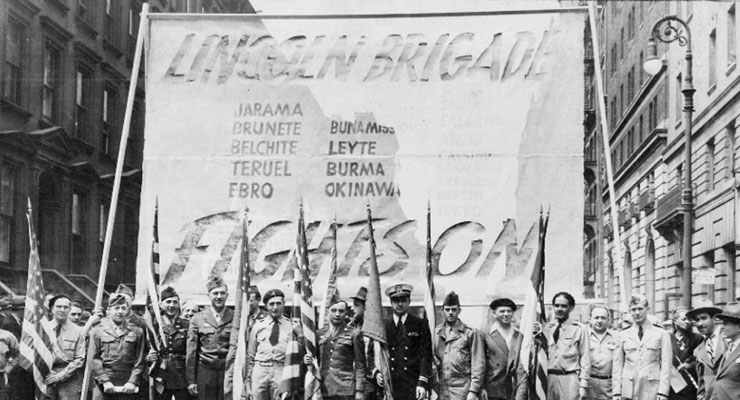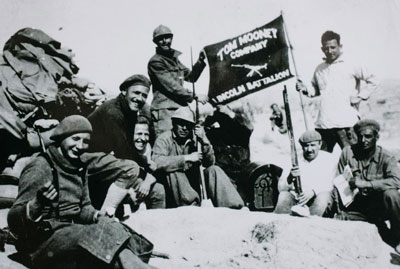
I first learned about the passionate Abraham Lincoln Brigade when I read Helen Graham’s The Spanish Civil War: A Very Short Introduction. I was immediately perplexed as to why any American would voluntarily travel halfway across the globe and risk his or her life to participate enthusiastically in a belligerent foreign conflict–a conflict which the United States government itself was failing to legitimize by not recognizing its gravity.
The strike contrast between the volunteers and the American government regarding the Spanish Civil War to me was most perplexing: while the American government remained neutral and strayed from taking a stance, a group of more than two thousand Americans radically and readily went against the views of their mainstream political infrastructure and wholeheartedly embraced not only a definite stance, but an extreme one that required deep political understanding and foresight clear from the blurry misconceptions clouding the average anti-communist American.
Initially,I myself labeled these volunteers as un-American because of their theoretical betrayal of the non-interventionist American philosophy, without realizing that the fascism they were fighting would from the basis of the dangerous ideologies that the American government desperately fought during World War II. This inaccurate perspective changed further after I read Part 1 of Carroll’s collective biography detailing the motives of the Abraham Lincoln Brigade volunteers.

I now have a better understanding of the overall mentality that these volunteers took with them as they braced themselves to fight fascism in Spain. I found it helpful to realize that the volunteers of the Lincoln Brigade were of their time pushed by the Great Depression to ideologically embrace alternative political belief systems— mainly communism. In other words, they sought to accept a system that would be able to replace capitalism, which they viewed as an inadequate and failed way of life because of the socioeconomic collapse of American society.
I also felt this understanding clarified my confusion when coupled with Carroll’s emphasis on the fact that communism during the time was not yet viewed as a totalitarian menace as it was after World War II or a failed ideology as it was in the 1990s. Most volunteers were young, single and from urban immigrant backgrounds and broken families, meaning that the Great Depression had the most impact on hurting them economically and hindering their relationships, oftentimes forcing them to face hardship as they moved to cities nearby in pursuit of employment.
A sentiment of outrage and frustration over the injustice of their situation emerged, leading to their support of an idealistic, hopeful philosophy and ultimately their decisions to join the fight abroad. The police brutality against these protestors was another pusher; Steve Nelson was one of the many examples of a future volunteer developing a sense of indignation from these occurrences.
Furthermore, I was previously unaware of how having a united interracial group to defeat an elite class was central to the color-blind agenda of communism. Harry Haywood embodied all that pushed most volunteers: he was an African-American communist who believed in the militant alliance with white workers to enable the end of African American oppression based on capitalism and would later volunteer after witnessing first hand job discrimination during his move to New York City. I quickly learned, however, each volunteer had their own individual story of radicalization that galvanized them politically.
Though there seemed to be overall feelings of dissent associated with the American capitalist society in all accounts, the volunteers themselves were connected to American principles. The Spanish struggle itself was compared to the American Civil War. Both had fighting that occurred to protect a symbolic government of the people from an illegal and unjust rebellion. Volunteers, thus, saw themselves in an encouraging light, as protectors of social change, and more broadly, democracy.
Furthermore, I found Carroll’s suggestion that the Lincoln Brigade represented the United States to be extremely powerful, as volunteers from most walks of life and racial backgrounds sought to unleash their feelings against the dangerous Franco regime directly. This depiction of the volunteers, along with understanding the evolution and context of their mentality, stripped me of my anti-American perception. If anything, volunteers saw themselves fighting on behalf of the future of the United States and the rest of the world.
For other Americans, they saw the fascist ideology as a threat to independent creativity altogether. I also thought it was progressive that the Lincoln Brigade had African Americans fight alongside white Americans so early in the 20th century, with opportunity to rise to leadership positions for the first time militaristically in American history.
The Young Communist League formed a social comfort compensating the frustration of the marketplace, allowing a community that could contribute to world and political coherence when American society meanwhile seemed perplexing.
Thus, I finally understand how, when the Spanish Civil War ignited, a group of young Americans— inexperienced militaristically but politically aware— chose to fight the ideologically-destructive fascism. Their fight was one for democracy worldwide, and a true fight motivated independent of their government’s stance. And so, approximately 80 years later, I have grown to further appreciate those who, like the men and women of the Abraham Lincoln Brigade, always stand for democracy, those who tirelessly act for justice and humanitarianism even when their government fails to do so, and those who continue to push the envelope in fighting for policies and political perspectives that bring peace for millions of Americans and global citizens worldwide. With every political decision we make, we too can be rebels for democracy.
BONUS VIDEO: Woody Guthrie’s 1944 recording of his song ‘Jarama Valley’ in support of the Abraham Lincoln Brigades
Leave a Reply